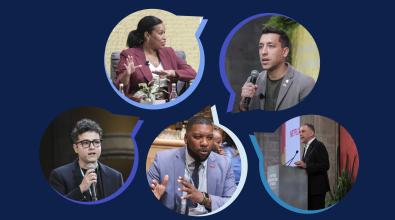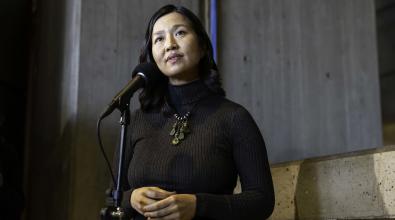Photo essay: Civil servants grow as leaders in the Global Mayors Challenge
For city leaders participating in the 2021 Global Mayors Challenge, the contest is about more than coming up with big ideas or hoping to win $1 million to implement them. It’s also about professional growth. While prototyping their proposals, local leaders learn to engage residents in new ways, to challenge their own assumptions, and to help city hall teams find more innovative ways of solving problems. In this photo essay, our team of Bloomberg Cities photographers celebrates some of the civil servants behind the 50 urban innovations that are finalists in the competition.
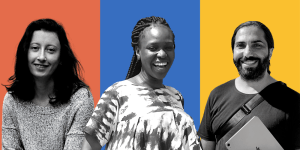

Photo: Farah AlQawasmeh
Amman, Jordan
Ahmad Zeyad believes that everyone has the right to access Amman’s basic services— without exceptions. The architect, urban planner, and researcher is working for Greater Amman Municipality on a Mayors Challenge project to map where key services are located throughout the city. These “connectivity maps” will be used to improve the city's emergency response and show which areas they need to invest more resources in. Ahmad hopes the project will enhance Amman’s resilience, help the city to invest in the most effective way, and make sure no one is left without access to critical services.

Photo: Sophie Burlie
Auckland, New Zealand
Cheilo Manalo (left), a senior healthy water specialist in Auckland, and her husband, Kevin, enjoy the māra hūpara, a traditional Māori playground, with their 3-year-old daughter, Danielle. This hūpara was built with the aim of carbon reduction. Now, Manalo and a team of Auckland civil servants are trying to make more projects like this possible by developing tools to measure, track, and reduce the carbon footprint of infrastructure. Through the Mayors Challenge, they are prototyping a carbon calculator, a digital dashboard, and a public-facing platform so Auckland residents can see the carbon impacts of infrastructure projects. “I’ve always wanted to help people and to work on something that has global impact, contributing to leaving the environment in better shape for the next generation,” Manalo says.

Photo: Gerald Rago
Butuan, Philippines
Vegetable prices are high in Butuan, yet farmers in the area often lose money growing them. That’s because middlemen often disrupt the balance between supply and demand. Pierre Anthony Joven (right) Butuan City’s Agriculturist, leads a team of civil servants who are using artificial intelligence and predictive data to change that. They’re building an app—AgriBoost—that directly connects farmers to buyers like restaurants and grocery stores. By getting predictive data, farmers can better estimate how much to plant to avoid scarcity and waste. “We can have an affordable price, if we have a steady or consistent supply,” Joven says. He hopes this Mayors Challenge project can be used to reduce the price of fresh food all over the country and make cities less reliant on imported food.
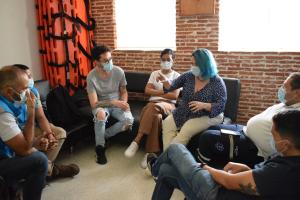
Photo: Eulalia Castro
Cartagena, Colombia
Ana María González-Forero (third from right), an international cooperation officer for the Cartagena Mayor’s office, speaks with residents and coworkers about improving emergency care and prevention. González-Forero and her Mayors Challenge team are working to ensure women are not disproportionately harmed by climate emergencies. “Beyond giving them priority in terms of response time, it is also necessary to analyze what are the unique care conditions that women should receive so that disasters do not affect them unequally, ” she explains. By testing their ideas with the community, the team learned that the tools developed for weather emergencies could also be used to attend to other emergency situations, like gender-based violence.
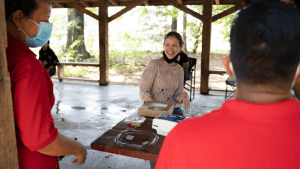
Photo: Angelina Katsanis
Durham, USA
Erin Parish, a design strategist for the city of Durham, takes a lunch break with members of Back on the Bull, a city-led group of volunteers helping “The Bull City” recover from the pandemic. She and her Mayors Challenge team are working with community groups like Back on the Bull as they look for ways to connect residents from historically marginalized communities with largely untapped resources—whether stimulus payments, rental assistance, or health care—that are outside of the city’s jurisdiction. "There’s a lot of heart in this project, and that’s because a lot of people doing this have heart for the work,” Parish says.

Photo: Yasmin Metz-Johnson
Freetown, Sierra Leone
Valena McEwan, communications lead for the Mayor Development Unit in Freetown, is part of the team fighting deforestation in Freetown. Through the Mayors Challenge, she and her colleagues launched the #FreetownTheTreeTown campaign and are testing ways to bring trees back to the city, such as creating financial incentives to re-plant trees and creating a trading market to fund reforestation. “My hope is that through the #FreetownTheTreeTown Campaign, all Freetonians will know that the survival of trees is integral to theirs,” she says. She’s been working to help residents understand the issues so they can help civil servants design solutions. “It is a lot easier to solve a problem with residents than solve a problem for them,” she says.

Photo: Clarissa Bell
Hermosillo, Mexico
Antonio Colin Canizales, project leader with the Hermosillo Mayors Challenge team, shows Hermosillo residents the bicycle and accompanying trailer that Hermosillo women will use to collect recyclables through the Bicicleando bike-recycling program. Canizales is leading the Mayors Challenge effort, which he hopes won’t just kickstart the city’s recycling rates, but also provide work opportunities for Hermosillo women, who were disproportionately impacted by job loss during COVID-19 lockdowns. “What makes it very significant is the gender perspective that is being integrated into the very vision of the project, this sense to activate the economy with a green perspective,” he says.

Photo: Jacques Nkinzingabo
Kigali, Rwanda
Solange Muhirwa (left), chief of urban planning for Kigali, talks with a resident named Marina about how to use the smart-waste disposal stations that the city has installed in one of Kigali’s many informal settlements. These settlements often have limited access to water and sanitation services, so Muhirwa and her Mayors Challenge team are installing waste disposal stations and building an underground water reservoir to improve sanitation and hygiene. "Informal settlement dwellers are particularly vulnerable to health and economic shocks caused by COVID-19, and its associated lockdowns,” Muhirwa says. “This pandemic has been a wake-up call for us to be innovative to facilitate resident recovery and increase resilience against future shocks.”

Photo: Ohene Kwabena Agyemang
Kumasi, Ghana
Joshua Nii Noye Tetteh-Nortey (second from left), a social development planner in Kumasi, speaks with other members of the Mayors Challenge team—from left: Osei Assibey Bonsu, Yvonne Naboo and Michael Agyemang—at an event with residents of Moshie Zongo, a low-income area of the city. Through the Mayors Challenge, these civil servants are hiring unemployed young people to construct sustainable container-based toilets in area homes. Currently, many residents of Moshie Zongo have to pay to use the limited number of public toilets. “Poor environmental sanitation and hygiene has been the challenge residents in the neighborhood are bedeviled with,” Tetteh-Nortey says. “[It has] also impacted negatively on the city’s effort to harness its full potential as the hub for tourism and African culture.” Tetteh-Nortey hopes that putting toilets in homes will reduce rates of communicable diseases like cholera, while making the city more appealing for investment.

Photo: Annie Barker
Lansing, USA
Judy Kehler, the Chief Strategy Officer for the Mayor of Lansing, teaches letters to the students of Lansing’s 10-day reading initiative. The program was part of a Mayors Challenge prototype to test ways to improve Lansing’s literacy rates by offering in-person and virtual enrichment for pre-K through third-grade students. Students showed significant improvement from their first day at the reading camp, Kehler says. The city will use the results to analyze and fine-tune intervention activities based on the data and input from students and parents. “This experience far exceeded my expectations and, quite frankly, was one of the most rewarding professional experiences I have encountered to date,” Kehler says.

Photo: Emilie Bossens
Leuven, Belgium
Jan Mellebeek, head of local policy action for the city of Leuven, rides along the green bicycle path to the neighborhood of Kessel-Lo. Mellebeek is part of a team of civil servants working to promote green transportation options like this one. As part of the Mayors Challenge, the city is testing the use of civic contracts to encourage residents to make more sustainable transportation choices. Getting input from residents was critical to developing the project. “The great advantage of the design thinking model is that you start from the perspective of the users,” Mellebeek says. “Often you automatically start thinking from the idea of 'what does the government want', but you have to think about 'what does a resident want.’”

Photo: Sana Ginwalla
Lusaka, Zambia
Professor Kasonde Bowa (left), who is Executive Dean of Medicine at the University of Lusaka, works with Lusaka residents on solutions for waste management. Bowa’s interest in the topic stems from his focus on public health—Lusaka’s lack of a comprehensive waste management system can lead to poor hygiene and illness. Along with civil servants from the Lusaka City Council, he’s testing a Mayors Challenge project called Waste 2 Cash, which will let residents turn waste into biogas, a sustainable alternative to charcoal and organic fertilizer that can be used to power home ovens and rejuvenate agricultural land. Bowa believes community involvement gives the project a better chance of success.“We have provided solutions in the past but they may stay in the research or the publications, they never really reach the community,” he says. “The human design perspective allows you to see what the community actually thinks about this, and how we can make a solution that is sustainable.”

Photo: Gathukia Mwangi
Meru, Kenya
Gitonga K. Angelo (center), who is director of environment and climate change for Meru City, visits a nearby farm with Meru’s Mayors Challenge team to learn how they can use Black Soldier Fly larvae to reduce organic waste. Angelo, who is in charge of the city’s waste management, is testing a program to have residents separate organic waste to be fed to the larvae, which will then create compost. “Involvement of residents on any project that has an implication for them is a critical success factor in that project,” Angelo explains.

Photo: Bilal Meshanni
Newark, USA
“‘Life-changing,’ ‘game-changing,’ these are the words I hear them say,” says Lakeesha Eure, Director of the Office of Violence Prevention in Newark, N.J. “They say, Ms. Lakeesha, thank you so much for this opportunity. This is a new beginning.”
Eure works with some of Newark’s repeat offenders, and through the Mayors Challenge she has created a group that supports these people with holistic care and mental health resources—rather than handcuffs. It’s part of a new approach to reducing crime in the city: treating violence as a public-health issue. Eure envisions a Newark where crime is reduced by improving social programs and increasing community engagement, a stark change for the city.

Photo: LaShance Perry
New Orleans, USA
Nellie Catzen (left), director for the Committee for a Better New Orleans, talks to city deputy chief of staff Liana Elliott about the “Trust-o-meter,” at an event to engage residents in New Orleans’ Ninth Ward. Catzen designed the Trust-o-meter to measure residents’ trust in city government as part of a Mayors Challenge project to engage New Orleanians and address the community problems that matter to them, starting with infrastructure. At community events, residents place stickers on the Trust-o-meter to rate the city government on a scale of 1-10 for metrics of trust, including transparency, accountability, empathy, and helpfulness. “If we could fill all the potholes that would be great,” Catzen says. “But if we can reestablish trust that would be revolutionary.” Through the Mayors Challenge, Catzen has found that the civil servants on what she calls the “front lines of city government” need to be empowered to make changes that matter to residents. “The people who do have that power are pretty isolated from the reality on the ground,” she says.

Photo: Hwa Pung Yoo
Paris, France
Louise Faux of Paris’ School Affairs Directorate sits in front of the Paris Climate Academy, which trains and certifies people aged 9-to-25 to take concrete action on climate change. Faux was instrumental in launching the space, which is part of the city’s Mayors Challenge effort to teach young people to take meaningful action to help the environment. “When I was growing up, I would have loved to have this kind of space,” she says. “ I had to learn how to do these kinds of things, such as becoming a vegetarian, by myself.” When Faux joined the project there were only three team members on the team. Now there are 30. “You take a step back and then you look at the people you’ve been working with and feel so proud of what we’ve achieved and everything we’ve done.”

Photo: Nate Sicotti
Phoenix, USA
Jovanna Parkhouse prepares to welcome job applicants inside the Mobile Career Unit, which travels the city bringing job openings directly to job seekers, at a test-run of the program in the parking lot of a Food City store. Parkhouse, a Workforce Development Supervisor for the city of Phoenix, and her team conceived of the Mobile Career Unit when they saw that Phoenix businesses were struggling to hire, even though unemployment remained high in some areas of the city. “We need to go out into the community and find residents employment by providing them with training resources, connecting them directly with employers, and breaking any barriers that are holding them back,” she says. Parkhouse says she’d also like to see mobile units for more government services, to bring them directly to the community.

Photo: Abhishek Gijare
Pune, India
Mandar Patil (right), a senior consultant with clean energy consultancy firm RMI India, investigates an electric vehicle as part of Pune’s EV Readiness Plan. The plan, being developed through the Mayors Challenge, aims to promote early adoption of electric vehicles in Pune, a city with one of the highest rates of car ownership in India. It’s the first initiative of its kind in a major Indian city, and Patil hopes it will set the tone of EV mobility policy in India. “Everyone is looking up to us, so it is crucial to make a plan that will ensure a smooth collaboration between every stakeholder and put the citizens first,” Patil says.

Photo: Joaquim Lima
Rio de Janeiro, Brazil
Carlos Krykhtine ( right), the Director of the Pereira Passos Institute, the research department for the city of Rio de Janeiro, walks through the streets of Jacarezinho, one of the city’s favelas, with a 4D-scanning operator. While 30 percent of Rio residents live in favelas, the city doesn’t have reliable maps of these areas—or data on population or housing conditions in them. Krykhtine says the unique structure and dynamics of favelas mean “problems and solutions have complex characteristics” For the Mayors Challenge, Krykhtine and other civil servants are creating 4D digital maps—the fourth “dimension” maps social and collaborative details of the area—to help the city identify structural problems and make more sustainable decisions in the area.

Photo: Soumya Sucharita Dash
Rourkela, India
Asutosh Nayak (left), CEO of Koel Fresh and one the leaders of Rourkela’s Mayors Challenge project, interviews a fruit and vegetable vendor about her food-storage needs. Without cold storage, vendors are forced to to throw away their produce at the end of the day or sell it at a loss. Through the Mayors Challenge, Nayak’s team has installed cold storage rooms in markets like this one, and they’re testing a program that allows vendors to store produce there overnight. “It will reduce food wastage by more than 15-20 percent and prevent distress-selling of more than 500 small vendors,” Nayak says.

Photo: Jin Huang
Taipei, Taiwan
Gordon Yang (left), a counselor for the Taipei City Government, tests exercise equipment for seniors alongside a trainer from the University of Taipei who specializes in physical education for older people. Yang is combining exercise and digital innovations to keep seniors in his city healthy. Through the Mayors Challenge, Yang leads a team of civil servants developing a chatbot called “樂齡智動趣” (Le Ling Zhi Dong Qu), which seniors can access on Taiwan’s most popular messaging app, “LINE.” The chatbot offers daily exercise routines, health-related advice, and even a chance to connect with other elders to fight the social isolation of COVID lockdowns. Yang has been working with seniors to get feedback on the chatbot, and his team is also prepping exercise equipment that the elders can use in-person after lockdown ends. “We hope that more and more citizens will be willing to use this app in the future to develop exercise habits,” Yang says.

Photo: Julián Camilo Ríos
Tunja, Colombia
Germán Camacho Barrera (right), Tunja’s Secretary of Infrastructure, assembles a cardboard bench with help from his assistant Alejandro Viasús. Camacho is leading the city’s Mayors Challenge project, which will employ Tunja residents to make indoor and outdoor furniture for public spaces such as libraries and parks—all from cardboard waste. “We teach them that through cardboard, with basic implements and some notions of design, almost anything can be made: a desk, a bed, a library,” says Camacho, whose office furniture is made entirely of cardboard. The new circular- economy program will employ people in a city that was hit hard by the pandemic while also dignifying the work of the cardboard collectors

Photo: Darlington Ojy Onwukwe
Umuaka, Nigeria
Onyedikachi Onyenze (center), Project Officer for the Mayor's Challenge in Umuaka, talks to vendors in the Umuaka Ultra Modern Market about new resources the city is creating to support women. Behind him are team members from the Women's Crisis Centre. Onyenze is working with them to address the biggest issues faced by women in the area: escalating violence against women and girls and lack of incentives to seek medical help. Through the Mayors Challenge, the city is building and testing an app that empowers women to report gender-based violence and access support services. Onyenze and his team learned during testing that many women stay in domestic violence situations because they don’t have the financial means to leave, so they’re also launching a microfinance loan program to support female business owners.

Photo: Ugne Zilinske
Vilnius, Lithuania
Unė Kaunaitė, Head of the Centre for Educational Progress in Vilnius, is part of a team aiming to transform the educational experience in Vilnius schools, including using digital tools to expand the classroom into places like the Mo Museum. In the wake of the COVID-19 pandemic, Kaunaitė and the team are prototyping a hybrid learning model to increase student engagement as a way to boost learning. The project relies heavily on immersive experiences, which will connect the standard learning process with “real-world” learning in public spaces like museums, theaters and factories throughout the city. Kaunaitė is working closely with teachers to research and create training packages and gather feedback that will guide the project.
